Toy poodles are the smallest variety of the poodle breed, reaching a height of around 10 inches and weighing between 4 to 6 pounds. They have a square-shaped body and typically stand as tall as they are long. Toy poodles have a proud bearing, with their heads held high and alert eyes. Their coats come in various colors, including black, brown, cream, white, and more. These dogs have a lifespan of 10 to 18 years and are known for being friendly, outgoing, and highly intelligent.
Key Takeaways:
- Toy poodles are the smallest variety of the poodle breed, reaching a height of around 10 inches.
- They typically weigh between 4 to 6 pounds and have a square-shaped body.
- Toy poodles have a proud bearing, with their heads held high and alert eyes.
- Their coats come in various colors, including black, brown, cream, white, and more.
- Toy poodles have a lifespan of 10 to 18 years and are known for being friendly, outgoing, and highly intelligent.
The Intelligence of Toy Poodles

Toy poodles are renowned for their exceptional intelligence, ranking among the smartest dog breeds. Their high level of intelligence makes them not only quick learners but also highly trainable companions. They possess an inherent eagerness to please their owners, which contributes to their ability to excel in training sessions and learn commands with ease.
These intelligent dogs thrive on mental stimulation and enjoy activities that challenge their minds. From puzzle toys to obedience training, toy poodles eagerly engage in tasks that keep their brains active. Their intelligence also enables them to quickly pick up on new tricks and commands, making them a joy to train.
Toy poodles are like little canine Einsteins, effortlessly showcasing their smarts and problem-solving abilities. Their intelligence is undoubtedly one of the key factors that contribute to their popularity as companions and performers in various dog sports and activities.
With their remarkable intelligence and advanced cognitive abilities, toy poodles consistently prove themselves to be one of the smartest breeds, bringing endless joy and entertainment to their lucky owners.
| Feature | Description |
|---|---|
| Intelligence | Highly intelligent and quick learners |
| Eagerness to Please | Show a strong desire to please their owners, making them highly trainable |
| Mental Stimulation | Thrive on activities that challenge their minds |
| Problem-Solving Abilities | Capable of solving puzzles and learning new tricks and commands |
| Adaptability | Quickly adapt to new environments and situations |
About Toy Poodle Size Range
When considering a toy poodle as a pet, it is important to understand their average size range. Toy poodles typically reach a height of around 10 inches, although individual heights may vary slightly. They have a compact and square-shaped body, with a weight range of 4 to 6 pounds. However, it is crucial to note that size can vary among individual toy poodles.
While the average height and weight provide a general guideline, it is essential to consider other factors such as overall body proportions and measurements. Toy poodles should be evaluated holistically rather than solely focusing on their height or weight when determining their size.
To illustrate the size range of toy poodles, the following table provides a visual representation:
| Category | Height (inches) | Weight (pounds) |
|---|---|---|
| Small Toy Poodle | 9-10 | 4-5 |
| Standard Toy Poodle | 10-11 | 5-6 |
| Large Toy Poodle | 11-12 | 6-7 |
Remember, size variations within toy poodles are natural, and it is important to prioritize their overall health and well-being over precise measurements.
Growth Stages of Toy Poodles
Toy poodles go through distinct growth stages as they mature into their full size. Understanding these stages is essential for toy poodle owners to provide appropriate care and monitor their development.
During the first few weeks after birth, toy poodle puppies experience rapid growth. They double their size within the first week and continue to grow quickly in the following weeks. By the age of 6 to 7 months, toy poodles generally reach their full height, which is around 10 inches. However, it may take a bit longer for them to fill out and achieve their adult weight. Most toy poodles will reach their full size by around 12 to 15 months. It is important to note that individual growth rates can vary, and not all toy poodles will follow the exact same timeline.
Here is a simplified toy poodle growth chart to provide a general idea of their growth stages:
| Age | Size | Weight |
|---|---|---|
| Birth to 2 weeks | Tiny | 60-120 grams |
| 2 to 4 weeks | Newborn | 200-300 grams |
| 4 to 6 weeks | Infant | 300-450 grams |
| 6 to 8 weeks | Young puppy | 450-600 grams |
| 8 to 12 weeks | Weaning | 600-800 grams |
| 12 to 16 weeks | Early puppy | 800-1,200 grams |
| 16 to 24 weeks | Mid puppy | 1.2-1.8 kilograms |
| 24 to 52 weeks | Late puppy | 1.8-3 kilograms |
| 12-15 months | Adult | 4-6 pounds |
Keep in mind that this toy poodle growth chart is just a general guideline. Each toy poodle may have slight variations in their growth patterns. Regular check-ups with a veterinarian can help ensure that your toy poodle is growing as expected and address any concerns related to their development.
Toy Poodle Weight Range
When it comes to determining the size of a toy poodle, weight is an important factor to consider. Toy poodles typically weigh between 4 to 6 pounds. However, some individuals may fall slightly outside of this weight range. It’s essential to remember that weight alone should not be the sole determinant of a toy poodle’s size. Other factors such as height, body composition, and overall proportions also contribute to their appearance and build.
To better understand the weight range of toy poodles, let’s take a closer look at a detailed table:
| Weight Range | Description |
|---|---|
| 4-5 pounds | Lightweight toy poodles with a petite build. |
| 5-6 pounds | Slightly larger toy poodles with a slightly heavier frame. |
Please be aware that maintaining a healthy weight is crucial for the overall well-being of toy poodles. Underweight or overweight toy poodles may experience various health issues, including joint problems, heart conditions, and reduced lifespan. Regular monitoring of their weight and consulting with a veterinarian can help ensure they stay within the appropriate weight range for their specific size and structure.
Exercise and Energy Level of Toy Poodles
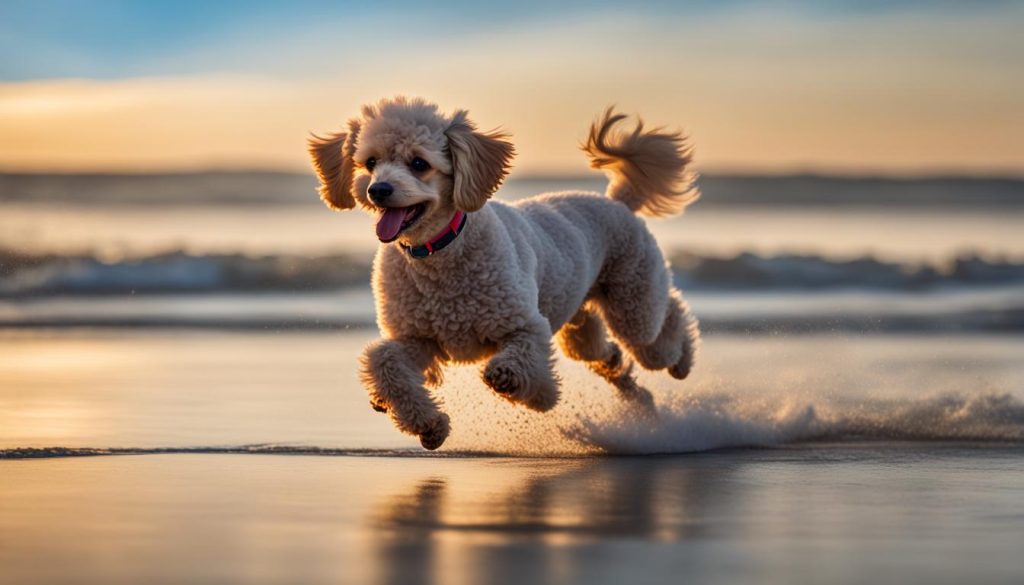
Toy poodles have a moderate energy level and low exercise needs compared to many other dog breeds. Despite their small size, they can meet their exercise requirements with daily walks, play sessions, and mental stimulation. Regular exercise is essential for their overall health and well-being, but it doesn’t require extensive physical activities or long hours of exercise.
Toy poodles are generally calm and adaptable, making them suitable for apartment living or households with limited space. They enjoy spending time with their owners and participating in activities that stimulate their minds. Puzzle toys, interactive games, and obedience training can provide mental enrichment and help prevent boredom.
While toy poodles are not hyperactive dogs, they do need daily exercise to prevent obesity and keep their muscles toned. Short walks around the neighborhood or playing fetch in a secure area can help keep them physically and mentally stimulated. It’s important to tailor the exercise routine to the individual toy poodle’s needs and energy level, as some may require more activity than others.
| Exercise Needs of Toy Poodles | Energy Level |
|---|---|
| Low exercise needs | Moderate |
| Daily walks | Adaptable |
| Play sessions | Calm |
| Mental stimulation |
Please be aware that each toy poodle is unique, and their exercise needs may vary based on age, health, and individual personality. It’s recommended to consult with a veterinarian to determine the appropriate exercise routine for your specific toy poodle.
To summarize, toy poodles have a moderate energy level and low exercise needs. They can meet their exercise requirements with daily walks, play sessions, and mental stimulation. Regular exercise is vital for their overall health, but it doesn’t require extensive physical activities. With their adaptability and calm nature, toy poodles make excellent companions for individuals or families in various living situations.
Toy Poodle Temperament and Interaction with Other Animals
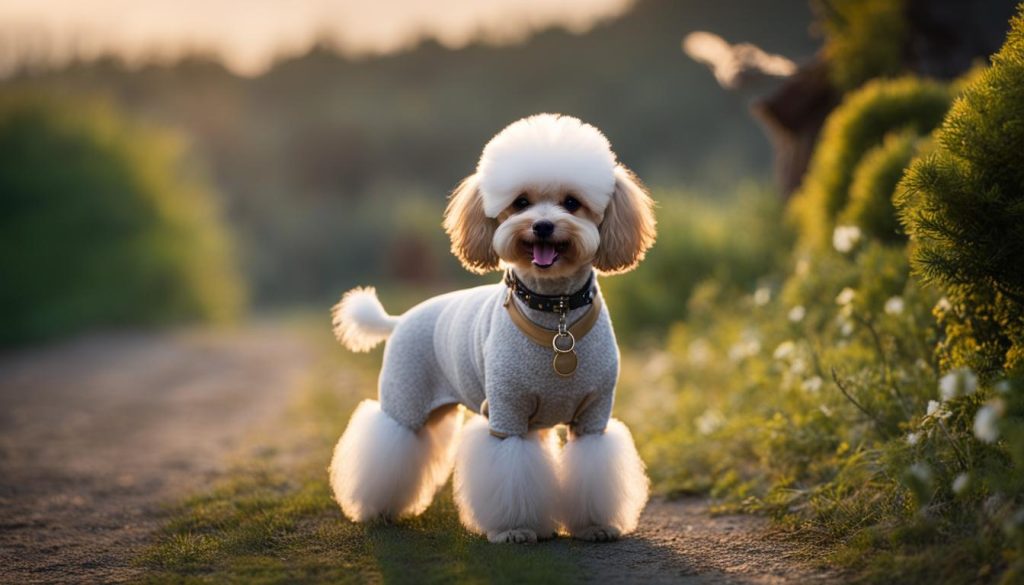
Toy poodles are known for their friendly and outgoing temperament. They are generally good with other animals, including cats, dogs, and even children. Their small size and playful nature make them compatible with various pets, fostering harmonious environments in multi-pet households. However, it is crucial to supervise interactions, especially with young children, to prevent any unintentional harm due to their delicate size.
Toy poodles have an innate intelligence and adaptability that allows them to bond easily with their human and animal companions. Their friendly nature and trainability make them suitable for therapy work and social gatherings. Proper socialization from a young age is essential to help toy poodles develop good behavior and confidence around other animals.
Socialization Tips:
- Expose your toy poodle to different animals and environments from a young age.
- Gradually introduce them to new animals, starting with calm and well-behaved individuals.
- Use positive reinforcement techniques to reward desired behaviors during interactions.
- Provide a safe and calm environment during introductions.
When introducing a new pet to your toy poodle, it is important to closely observe their initial interactions. Ensure that both animals feel comfortable and establish positive associations with each other. Consulting a professional dog trainer or behaviorist can provide valuable guidance on how to facilitate a smooth introduction and maintain a peaceful coexistence between your toy poodle and other animals.
| Pros of Toy Poodles’ Temperament | Cons of Toy Poodles’ Temperament |
|---|---|
| Friendliness towards other animals | Potential for separation anxiety |
| Trainability and obedience | Possibility of becoming overprotective if not properly socialized |
| Adaptability to various environments | May require supervision with young children due to their delicate size |
Toy poodles are friendly, sociable, and adaptable dogs that generally get along well with other animals. Their intelligence and trainability make them suitable for families with multiple pets, and their small size allows them to comfortably fit into various living situations. However, close supervision is necessary when introducing them to young children or unfamiliar animals to ensure a safe and harmonious interaction.
Grooming Needs of Toy Poodles
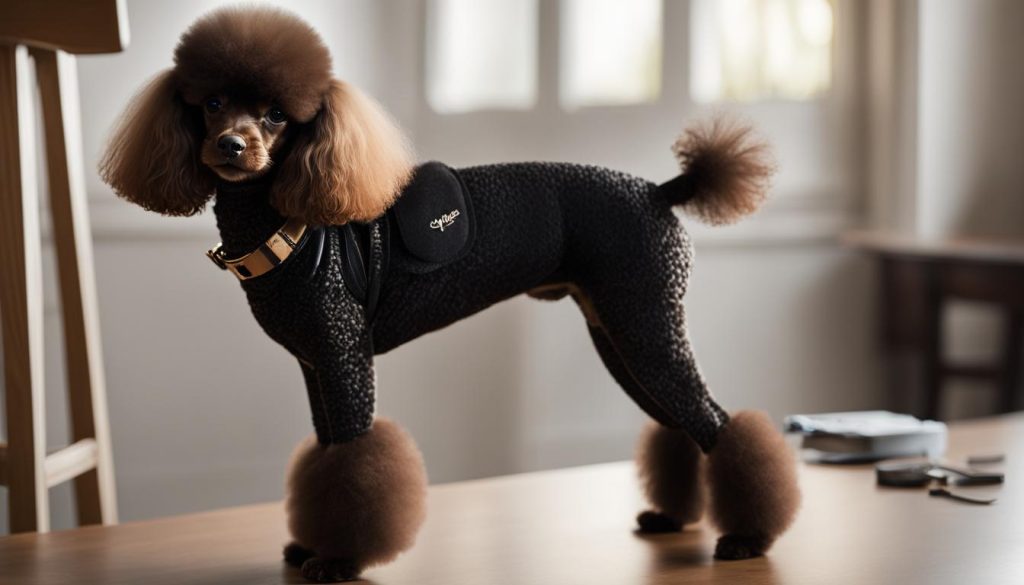
Toy poodles have curly coats that require regular grooming and maintenance. Their hair grows continuously and does not shed much, making them a good choice for individuals with allergies. Regular brushing is necessary to prevent matting and keep their coat in good condition.
Toy poodles may require a bath and professional grooming every four to six weeks. This not only helps keep their coat clean but also promotes a healthy and glossy appearance. Additionally, attention should be given to their dental health and ear care to prevent infections.
Grooming a toy poodle involves more than just brushing and bathing. Their nails should be trimmed regularly to prevent overgrowth and discomfort. It is also essential to clean their ears and check for any signs of infection, such as redness or discharge. Regular dental care, including brushing their teeth or providing dental treats, can help maintain their oral health.
| Grooming Needs of Toy Poodles | Frequency |
|---|---|
| Brushing | Every few days |
| Bathing | Every four to six weeks |
| Nail trimming | Every three to four weeks |
| Ear cleaning | Once a week |
| Dental care | Daily |
Regular grooming not only keeps your toy poodle looking their best but also helps maintain their overall health and well-being. It provides an opportunity to check for any signs of skin issues, parasites, or other abnormalities. Establishing a grooming routine early on and ensuring your toy poodle is comfortable with the process can make it an enjoyable bonding experience for both of you.
Common Health Issues of Toy Poodles
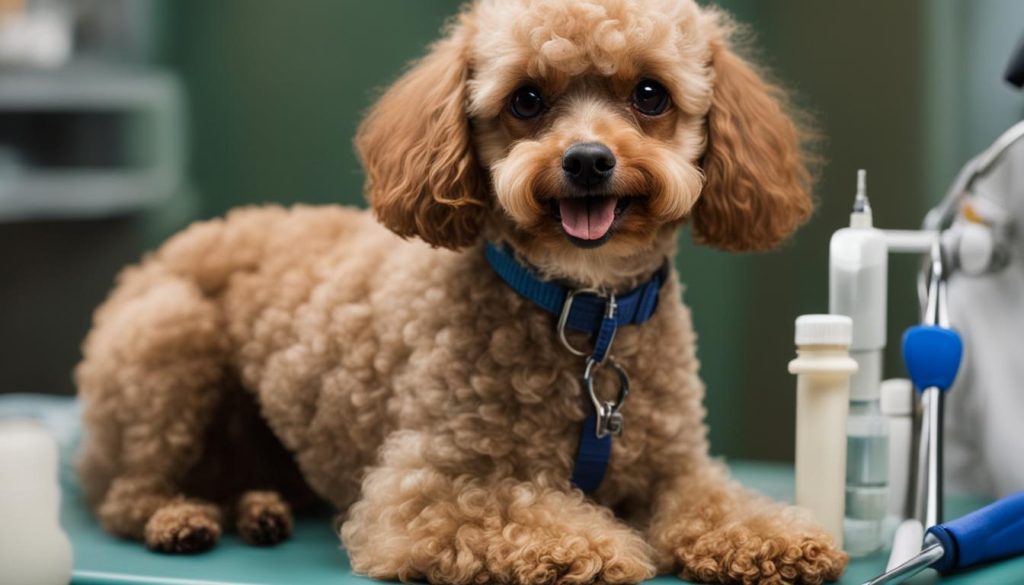
Toy poodles, like all dog breeds, can be prone to certain health issues. It’s important for potential owners to be aware of these conditions and take the necessary steps to maintain their toy poodle’s health. Here are some of the common health issues that toy poodles may face:
- Progressive Retinal Atrophy (PRA): PRA is a group of eye diseases that can lead to vision loss and even blindness. Regular eye check-ups with a veterinarian are essential to monitor and manage any potential eye issues.
- Patellar Luxation: Patellar luxation is a condition where the kneecap slips out of place, causing discomfort and mobility issues. Some toy poodles may require surgery to correct this condition, while others can manage it through medication and physical therapy.
- Legg-Calvé-Perthes Disease: Legg-Calvé-Perthes disease is a degenerative condition that affects the hip joint, leading to pain and lameness. Treatment options include medication, physical therapy, and in some cases, surgery.
- Ear Infections: Toy poodles, like many dogs with floppy ears, are prone to ear infections. Regular cleaning and inspection of the ears can help prevent infections and ensure good ear health.
- Dental Disease: Toy poodles can be susceptible to dental issues such as tooth decay and gum disease. Regular dental care, including brushing their teeth and providing dental treats, can help maintain their oral health.
- Tracheal Collapse: Toy poodles may be at a higher risk for tracheal collapse, a condition where the windpipe becomes weak and narrows, causing breathing difficulties. Avoiding excessive pulling on a leash and using a harness instead of a collar can help minimize the risk.
- Von Willebrand’s Disease: Von Willebrand’s disease is a genetic blood clotting disorder that can cause excessive bleeding. It’s important to inform your veterinarian if your toy poodle has this condition to ensure proper management and preventative measures.
Regular veterinary check-ups, a balanced diet, regular exercise, and proper grooming are crucial for maintaining the overall health and well-being of toy poodles. Monitoring for any signs of discomfort or abnormal behavior and seeking veterinary care promptly can help manage and prevent potential health issues.
Table: Common Health Issues of Toy Poodles
| Health Issue | Symptoms | Treatment | Preventive Measures |
|---|---|---|---|
| Progressive Retinal Atrophy (PRA) | Vision loss, night blindness | Regular eye check-ups, potential treatment based on severity | Genetic testing, proper nutrition |
| Patellar Luxation | Limping, lameness, pain | Medication, physical therapy, or surgery | Avoid excessive jumping, regular exercise |
| Legg-Calvé-Perthes Disease | Limping, pain, lameness | Medication, physical therapy, or surgery | Genetic testing, proper nutrition, regular exercise |
| Ear Infections | Head shaking, scratching at ears, discharge | Medication, regular cleaning | Regular ear cleaning, dry ears after bathing |
| Dental Disease | Bad breath, tooth decay, gum inflammation | Regular dental check-ups, teeth cleaning, dental treats | Regular dental care, dental-friendly diet |
| Tracheal Collapse | Coughing, breathing difficulties | Weight management, avoiding excessive pulling on a leash | Using a harness instead of a collar |
| Von Willebrand’s Disease | Excessive bleeding, bruising | Proper management, potential treatment based on severity | Genetic testing, informing veterinarians |
Feeding and Nutrition for Toy Poodles
Proper feeding and nutrition are essential for the health and well-being of toy poodles. Providing a balanced diet is key to ensuring they receive the necessary nutrients for their small size and high energy levels. Toy poodles should be fed a high-quality commercial dog food that is approved by the Association of American Feed Control Officials (AAFCO). These foods are specifically formulated to meet the nutritional needs of toy poodles and provide a well-rounded diet.
When it comes to portion sizes, it is important to consult with a veterinarian to determine the appropriate amount based on your toy poodle’s age, weight, and activity level. Overfeeding can lead to obesity, which can have negative effects on their overall health and quality of life. Conversely, underfeeding can result in nutrient deficiencies and inadequate growth.
In addition to commercial dog food, toy poodles can also benefit from the inclusion of fresh, whole foods in their diet. This can include lean meats, vegetables, fruits, and grains. However, it is important to be aware of which foods are safe for dogs and to avoid any ingredients that may be toxic to them. Consult with a veterinarian to determine the best options for incorporating fresh foods into your toy poodle’s diet.
Dietary Considerations and Special Needs
While toy poodles can generally thrive on a balanced commercial dog food diet, there are certain dietary considerations and special needs to be aware of. Some toy poodles may have food sensitivities or allergies, which require a specialized diet. In such cases, a veterinarian can help identify and recommend appropriate hypoallergenic or limited ingredient dog foods.
Additionally, as toy poodles age, their nutritional needs may change. Senior toy poodles may require a diet that is lower in calories and higher in joint-supporting nutrients. Consulting with a veterinarian on any specific dietary requirements or restrictions for your toy poodle is crucial to ensure their health and well-being. Regular monitoring of their weight and overall body condition is also important to make adjustments to their diet as needed.
| Key Considerations | Guidelines |
|---|---|
| Commercial Dog Food | Choose a high-quality dog food approved by AAFCO. |
| Portion Sizes | Consult with a veterinarian to determine appropriate feeding quantities. |
| Incorporating Fresh Foods | Include lean meats, vegetables, fruits, and grains with veterinary guidance. |
| Dietary Considerations | Be aware of food sensitivities, allergies, and special dietary needs. |
| Senior Toy Poodle Nutrition | Adjust diet as toy poodles age to meet changing nutritional requirements. |
Toy Poodle Behavior and Training
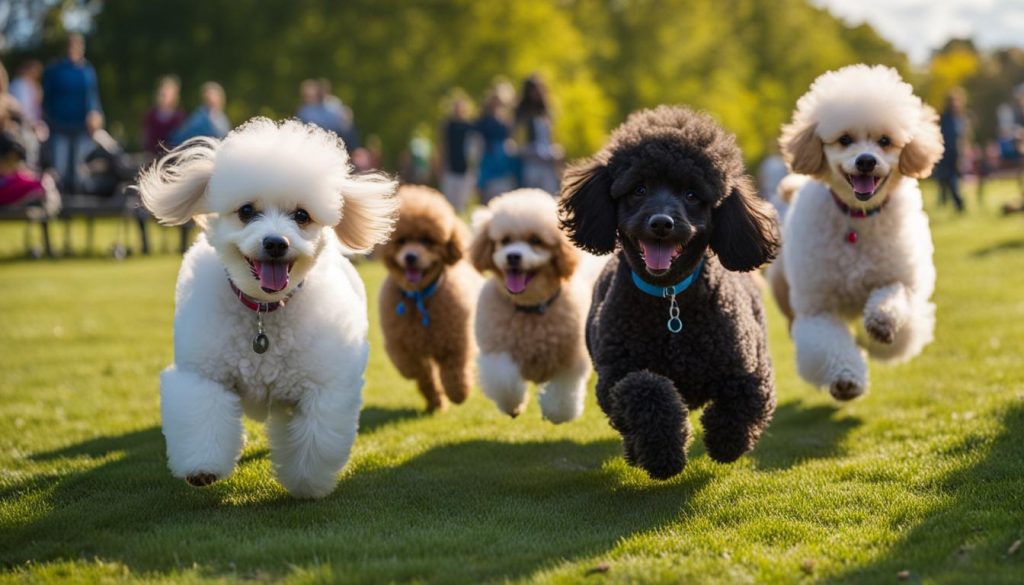
When it comes to behavior, toy poodles are known for their playful and self-confident personality. These little dogs have a natural charm that charms their owners and makes them delightful companions. Toy poodles are highly sociable and enjoy being part of the family, making them excellent pets for households with children and other animals. They have a friendly temperament and are generally good with cats, dogs, and other pets.
Toy poodles are highly intelligent and eager to please, making them easy to train. They excel in obedience training and can quickly learn various commands and tricks. Positive reinforcement methods work best with toy poodles, as they respond well to praise, treats, and rewards. It is important to start training and socializing them from an early age to ensure they develop good manners and become well-rounded dogs.
As with any dog breed, toy poodles require mental stimulation to prevent boredom and behavioral issues. Engaging them in activities such as obedience training, nose work, and agility can provide the mental enrichment they need. These activities not only keep them physically fit but also challenge their minds and prevent them from becoming restless or anxious.
Toy Poodle Personality Traits
The toy poodle’s personality traits make them highly adaptable and well-suited for various living situations. Their moderate energy level and low exercise needs make them suitable for apartment living, as they do not require a large yard to meet their exercise requirements. They are also great companions for seniors and individuals with limited mobility, as they are small, affectionate, and easy to manage.
Training Tips for Toy Poodles
When training toy poodles, it is important to use positive reinforcement techniques and be consistent in your approach. Here are some training tips to keep in mind:
- Start training from a young age to establish good behaviors and prevent bad habits from forming.
- Use rewards such as treats, praise, and playtime to motivate and reinforce desired behaviors.
- Keep training sessions short and engaging to prevent boredom and maintain their focus.
- Be patient and consistent, as toy poodles may take some time to grasp new commands.
- Provide mental stimulation through puzzle toys, interactive games, and training exercises to keep them mentally challenged.
To summarize, toy poodles have a playful and self-confident personality that makes them wonderful companions. With their high intelligence and eagerness to please, they are easy to train and excel in various activities. By understanding their behavior traits and providing them with the proper training and mental stimulation, toy poodles can thrive and become well-rounded pets.
Wrapping Up
To summarize, toy poodles are a highly sought-after small breed, known for their intelligence, friendly temperament, and moderate exercise needs. They make wonderful family pets and companions due to their adaptability and affectionate nature.
Toy poodles have specific grooming requirements that should be regularly maintained to keep their curly coats in good condition. Regular veterinary check-ups and preventive care are crucial to managing and preventing potential health issues that they may be prone to.
With proper training, socialization, and care, toy poodles can thrive in various environments and provide a lifetime of companionship and joy. If you’re looking for a small dog that is intelligent, friendly, and easily trainable, the toy poodle may be the perfect choice for you.
FAQ
How big do toy poodles get?
Toy poodles reach a height of around 10 inches and weigh between 4 to 6 pounds.
Are toy poodles one of the smartest dog breeds?
Yes, toy poodles consistently rank as one of the smartest dog breeds.
What is the size range of toy poodles?
Toy poodles have an average height of around 10 inches, but individual sizes can vary slightly within this range.
How do toy poodles grow?
Toy poodles reach their full height by around 6 to 7 months and reach their full size by 12 to 15 months.
What is the weight range for toy poodles?
Toy poodles typically weigh between 4 to 6 pounds, but individual weights can vary within this range.
What are the exercise needs of toy poodles?
Toy poodles have low exercise needs and can be satisfied with daily walks, play sessions, and mental stimulation.
Are toy poodles good with other animals?
Yes, toy poodles have a friendly temperament and are known to be good with cats, children, other dogs, and families.
What are the grooming needs of toy poodles?
Toy poodles have curly coats that require regular brushing, baths, and professional grooming every four to six weeks.
What are common health issues in toy poodles?
Toy poodles may be prone to progressive retinal atrophy, patellar luxation, Legg-Calvé-Perthes disease, ear infections, dental disease, tracheal collapse, and Von Willebrand’s disease.
What should I feed my toy poodle?
Toy poodles should be fed a high-quality commercial dog food approved by the Association of American Feed Control Officials (AAFCO).
How should I train my toy poodle?
Toy poodles are highly intelligent and respond well to positive reinforcement training methods. Mental stimulation is important to prevent boredom and behavioral issues.
Can toy poodles be good family pets?
Yes, toy poodles make excellent family pets and companions due to their friendly temperament and adaptability.






